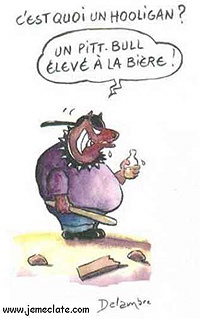Cracking down on crime in a cellular era
Dutch Police have added a kind of cellular
door-to-door search - mass text messaging in search of criminal information - to
their arsenal.

When soccer fans rioted in Rotterdam last April - this time targeting the police, not just rival fans - they might have expected a fierce chase. There was no way to foresee, however, the unique wireless wrinkle used in the pursuit by prosecutors determined to round up as many of the offenders as possible.
After the initial phase of the investigation left many of more than 200 suspects on the loose, the Dutch authorities turned to a kind of cellular door-to-door search - mass text messaging in search of criminal information.
------------
The clash was a uniquely bloody event for the department, with 50 officers badly hurt, according to Degraaff. Approximately 40 people were arrested on the scene.
Video images taken by the police during the melee were used to add 250 suspects, Degraaff said. Permission to show the image grabs on Dutch television and a police Web site was granted by the authorities.
Unsatisfied with the results of those efforts, prosecutors decided to try using SMS for the first time in search of more witnesses.
Investigators sent the SMS to 17,000 cellular subscribers, telling recipients that their phones were known to have been near the riot and to call the police with any information. The numbers were obtained from regional mobile carriers, whose records showed which phones were present in the riot area.
Since the message was sent out in July, Degraaff said, arrests in the case have surpassed 130, with 100 suspects having begun court proceedings. Degraaff said her office believed the SMS effort played a role in leading to the additional arrests.
The agency has dubbed the tactic "digital door-to-door," a reference to the door-to-door search for witness information police officers typically conduct in the area of a crime.
------------
In the case of mass SMS, Degraaff said prosecutors obtained the numbers without any names, broadcasting the message without having any data about the identity of the recipients, a function of Dutch privacy laws.
Privacy vs. legitimate law enforcement will always be a necessary topic in a society becoming more and more interleaved with technology and communications. The fear consistently remains one of abuse by government.
Posted: Sun - October 30, 2005 at 10:56 AM